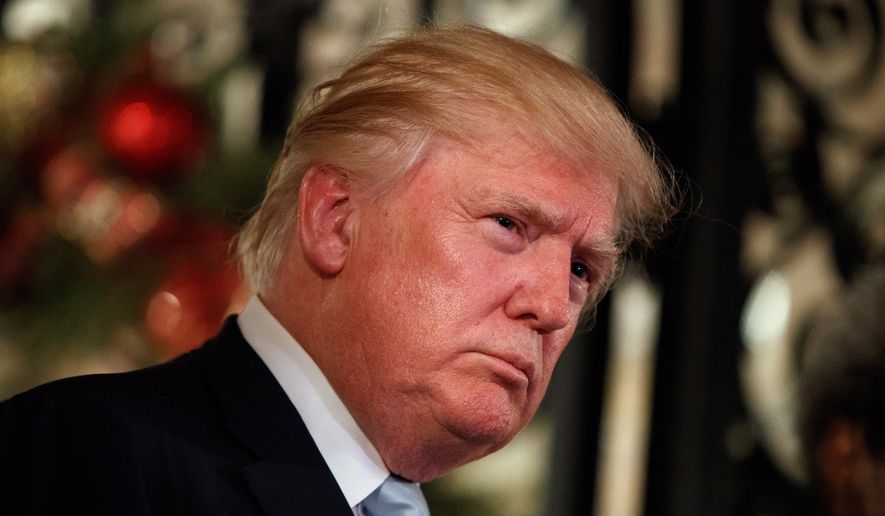President Obama and senior congressional Republicans said Sunday it is clear that Russia hacked emails to interfere with the U.S. election, but President-elect Donald Trump rejected talk of punishing Russian President Vladimir Putin, saying Democrats and the White House invited attacks through weak cyberdefenses.
The U.S. intelligence community concluded that Mr. Putin wanted former Secretary of State Hillary Clinton to lose the November contest and clearly preferred Mr. Trump, according to its assessment released Friday.
Mr. Obama, who ordered the report, acknowledged that he failed to realize the extent of Mr. Putin’s ambitions in cyberspace.
“I don’t think I underestimated him, but I think that I underestimated the degree to which, in this new information age, it is possible for misinformation for cyberhacking and so forth to have an impact on our open societies, our open systems, to insinuate themselves into our democratic practices in ways that I think are accelerating,” he told ABC’s “This Week” in a wide-ranging interview.
Sen. Lindsey Graham, South Carolina Republican, and Sen. John McCain, Arizona Republican, implored Mr. Trump not to make the same mistake. Failure to punish the Russians would allow them to interfere in elections within the U.S. or elsewhere, they said.
“You can’t go on with your life as a democracy when a foreign entity is trying to compromise the election process. So, Mr. President-elect, it is very important that you show leadership here,” Mr. Graham told NBC’s “Meet the Press.”
Russians had access to the Democratic National Committee’s network from July 2015 through at least June 2016, and its military intelligence service compromised Democratic Party officials’ email accounts from March to May last year, U.S. intelligence agencies said in their report.
Russian intelligence then had the information shared through WikiLeaks and other online leakers, the U.S. agencies said.
Mr. Trump, who has questioned the U.S. version of events, was briefed on the report Friday and afterward released a statement that seemed to spread blame.
“While Russia, China, other countries, outside groups and people are consistently trying to break through the cyber infrastructure of our governmental institutions, businesses and organizations including the Democrat National Committee, there was absolutely no effect on the outcome of the election including the fact that there was no tampering whatsoever with voting machines,” he said.
Mr. Trump also said that, as president, he will form a task force to make recommendations about how to defend against cyberattacks, though he insisted the hacking did not affect the election results. Congressional Republican leaders echoed that argument.
The president-elect and his team continued to focus on the political implications of the hacking probe Sunday, casting Democrats as sore losers grasping at straws to justify their poor performance in November.
Russia “did not succeed in throwing the election to Donald Trump. That’s very clear in this report,” incoming White House adviser Kellyanne Conway told NBC.
The report was highly redacted and offered no specific evidence of the hacking. It outlined conclusions of the FBI, the CIA and the National Security Agency about Moscow’s motives and intentions.
“There were no fireworks in that report because there was no firewall at the DNC,” Ms. Conway told CNN’s “State of the Union.”
She said American voters “didn’t need WikiLeaks” to convince them that Mr. Trump was a better choice for president than Mrs. Clinton, even though her former boss frequently cited the online leakers in the homestretch of the campaign.
Mr. Graham, who sparred with Mr. Trump during the Republican primary, said the president-elect must look beyond the election results to prevent further attacks.
“I think he’s worried that inquiring into what Russia did in the election is going to undermine his credibility and his legitimacy. Quite frankly, I haven’t heard any Democrat at all of prominence say that we doubt that Donald Trump won,” Mr. Graham said.
“Putin’s not the reason that Clinton lost and Trump won. I don’t think anybody’s saying that,” he said. “So Mr. President-elect, that’s not what we’re trying to do. What we’re trying to do is find out what the Russians did in our elections and make sure that other people, including the Russians, won’t do it next time.”
Mr. McCain said the cyberthreat extends beyond elections, so it is time for a tough reaction.
“It is across the board, including military secrets that we have, including the ability to shut down satellites, including the ability to shut down power plants,” he told NBC. “I mean, they can do grave danger to the United States of America. We never tried to do anything like that.”
• Tom Howell Jr. can be reached at thowell@washingtontimes.com.




Please read our comment policy before commenting.